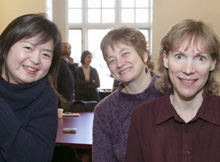Flexibility, innovation, diversity: The SIP experience

Three directions, same program: Seen at the SIP breakfast are PhD student Tomoko Matsuda, examining peace education in Middle Eastern schools; MSc student Cindy Wright-Paradis, who is studying mitochondria, our cellsí miniature power stations; and MA student J. Penney Burton, who is exploring the work of women of the Arts and Crafts movement.
Photo by Andrew Dobrowolskyj
Each of the young scholars seen here is a member of Concordia’s Special Individualized Program (SIP). They shared their experiences with other SIP members at a breakfast on Nov. 19.
Started in the 1979-80 academic year by the School of Graduate Studies, SIP was intended to meet the needs of students working towards a master’s or doctorate who don’t fall into traditional categories. All four Concordia Faculties are represented.
Applicants to the program create their own roadmap of study. They submit their ideas to their chosen faculty members, who decide if the proposals are valid and interesting. While the key is flexibility, the program does follow a traditional time frame, with rigorous standards.
Nina Howe, Associate Dean of Graduate Studies, said, “SIP is often a jumping-off point for our mature students, who bring a focused approach to their studies. Many of our pilot projects develop into courses of study.”
Over the years, the SIP program has grown to include 50 students.
SIP is a reflection of Concordia’s penchant for innovation. It’s one of the few individualized study programs offered in Quebec, and other universities are beginning to take note. Its versatility supports new fields of study and research that might otherwise be overlooked.
Wright-Paradis said, “SIP offered me a chance to create a master’s level for my kind of research in a way never done before.”
She is part of the Exercise Science Department, and since her field is relatively new, her faculty doesn’t offer a master’s program. She joined SIP in order to be the first person to receive a SIP-Master’s of Science (Exercise Science) by studying how our cells utilize oxygen to make energy.
SIP also encourages an inter-disciplinary approach, allowing its participants to gain expertise across various disciplines. The program attracts students suited for the challenge of working independently without a formal structure, and its members often combine their experience and knowledge.
Burton, a recent graduate of the Nova Scotia College of Art and Design (NSCAD), specializes in Arts and Crafts history as well as art education, but she is also an artist who wants to continue creating. Faced with the prospect of sacrificing one for the other, she turned to SIP.
“One reason I chose this program was that it allowed me to keep studying and keep being an artist. It’s a way to meld the two together,” she said.
SIP is also part of the diversity that makes Concordia unique, allowing members to explore other cultures.
Matsuda has been able to combine two areas of expertise, education and political science, to study the peace process in the Middle East.
“I’ve been looking at both Arab and Israeli elementary school textbooks in order to study the negative images and see how the education is the core to the peace process and how politics can be changed at a social level,” she said.
Graduates of the program, like Professor Lucie Lequin, chair of the Departement d'Etudes françaises, and Associate Professor Luc Varin, chair of the Department of Biology, went on to teaching and research. Others apply their knowledge in various professions, some of which, as Nina Howe said, are emerging as a result of the SIP program.